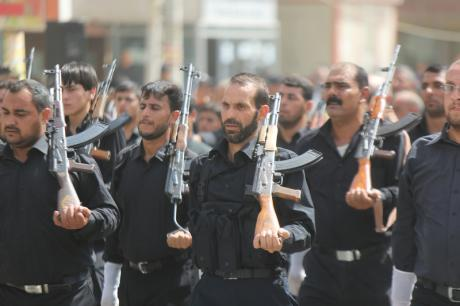
An approach to Iraq focused on military intervention, with some humanitarian assistance, has defied the complexity of the domestic and regional kaleidoscope. No wonder it is failing.
The capture of Tikrit from Islamic State (IS) by Iraqi Security Forces (ISF) in early April, with the help of US airstrikes and Iranian advisors, appeared simultaneously to preserve and undermine the Iraqi state. While representing a significant territorial victory in the fight against IS, reports indicated that the group’s expulsion was followed by a wave of looting, summary executions and other atrocities, tarnishing the town’s ‘liberation’ and the forces associated with it.
While the ISF formally and visibly did the capturing, and took most of the credit, Iraq’s Shia militias dominated the first two weeks of the assault. These forces largely operate outside of state control—in spite of the recent move by the prime minister (and commander-in-chief), Haider al-Abadi, to bring them under his authority—and do most of the fighting against the Wahhabi-inspired Sunni IS.
The event fitted well into the common narrative of the conflict on which much of the west’s intervention against IS in Iraq is based. Its main elements—often espoused by US-, Israeli- and Gulf-based media and analysts—are questioning the chances of survival of the Iraqi state, perceiving IS as a signficant threat through the lens of global terrorism, framing Iran as the region’s challenger to the status quo, and suggesting that a fight for hegemony is taking place across the Middle East which pits Sunni against Shia regimes and groups. But this narrative is misleading.
Fear of implosion
First, it is doubtful that Iraq’s days as a unitary state are numbered. This proposition is mainly based on the combination of centrifugal domestic political forces—divergent Sunnis, Shia and Kurds—and centripetal regional forces influencing national affairs. Yet none of Iraq’s key neighbours (Iran, Saudi Arabia, Turkey) wishes to see it disappear as a unitary state. They may prefer a weak Iraq for various reasons but they fear implosion bringing insecurity, radicalism, refugees and aspirations to self-determination across their borders.
Moreover, Iraq’s Sunnis have no viable alternative. A Sunni rump state is not only politically impossible given the record of the last ten years of radical groups emerging from Sunni-populated territorities, but also financially untenable. And Iraq’s Kurds are unlikely to declare independence in the face of resistance from both Turkey and Iran, considering their sizeable Kurdish populations. As long as Turkey transfers payments for Kurdish oil to the treasury in Bagdad instead of Erbil, the Kurds cannot really afford it either.
Secondly, and relatedly, Iraq’s Shia are more nationalistic and more fragmented than one might think. While some groups, such as Kataib Hezbollah, essentially owe allegiance to Tehran, far from all Shia militias are Iranian proxies—take Muqtada al-Sadr’s ‘Mahdi army’. And while Iraq’s Shia took up arms when IS arrived at the gates of Baghdad, this was much less a sectarian mobilisation than a response to a strident nationalistic call from the grand ayatollah, Ali al-Sistani, which showed little symphathy for sectarian narratives. Al-Sistani’s influence is significant—he is perhaps as close as one can find to a national figure in Iraq—and in the Shia world his authority rivals, or even surpasses, that of his Iranian counterparts.
Thirdly, it is not just Iranian influence in Iraq which incentivises violence. While it is materially significant (advisors, weapons and funds), prolonged Saudi export of Wahhabism—its extremely conservative interpretation of Islam—has also played its part. As socio-religious influence, Wahhabism spreads more under the radar and with greater deniability than Iranian arms or pictures of Qassem Suleimani, leader of Iran’s Quds force, but it is not less of a hindrance to resolving Iraq’s governance crisis.
Fourthly, while Iraq’s Sunnis are not necessarily true believers in the ideology of IS they are deeply distrustful of the Iraqi state. Since 2003 they have been consistently marginalised by the government, its bureaucracy and corrupt ‘checkpoint army’. Over time, Iraq’s state institutions have increasingly moved away from treating the country’s citizens impartially on the basis of the constitution. What remains of that state is perceived as having been captured by Iraq’s Shia, while benefiting from significant international military support. This is seen as deeply threatening by many Sunnis—especially in the light of atrocities such as those that followed the capture of Tikrit.
Finally, the international community may continue to pretend that the crisis in Iraq can be resolved without addressing the crisis in Syria, but this is wishful thinking. Not only does IS operate freely across the border—re-emerging in Iraq having regained strength in Syria—but also it is the combined outcomes of these wars which feature in regional calculations. So regional involvement is only likely to become more constructive if a solution to both conflicts can be identified which is acceptable to the main players: Iran, Turkey and Saudi Arabia.
Counter-narrative
These five points provide a counter-narrative on the crisis in Iraq. Disturbingly, most of the west’s intervention—and a lot of its reporting—does not take this complexity much into account. Focused on driving IS out of Anbar province and Mosul city, the US-led international coalition has not addressed how Iraq can become a state which functions for all its citizens. Engaged in Iraq but neglecting the war in Syria, western countries risk strengthening IS or creating a successor sooner or later. And by accepting or even reinforcing simplistic, Sunni versus Shia framing, they reduce the agency of Iraqi actors who can play a more constructive role.
A nuanced understanding is needed of the various regional and domestic stakeholders, and a greater range of instruments than just humanitarian assistance and military intervention need to be deployed. The risk of the current approach is that if violence is brought to a halt it will be merely the silence before the next storm.
This article has been republished from Opendemocracy.net.